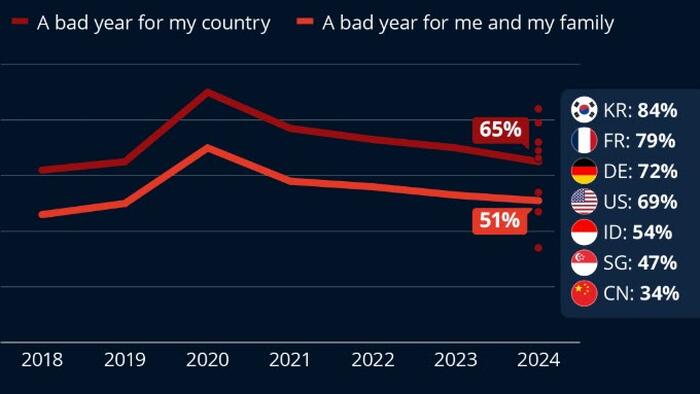Since the onset of the Covid-19 pandemic in 2020, the world has been in an ongoing state of crisis, affecting numerous aspects of life globally. Statista’s Felix Richter reflects that with each passing year, particularly at the close of December, a persistent hope has emerged that the upcoming year would bring better circumstances. However, persistent global conflicts, notably the wars in Ukraine and the Middle East, alongside a lingering cost of living crisis, have cast a long shadow over the prospects for improvement in 2024. Additionally, political instability in notable nations such as France, Germany, and South Korea has contributed to a generally pessimistic outlook as the new year approaches, leading many to feel discouraged about global conditions.
Despite these ongoing challenges, a recent Ipsos survey reveals a slight shift in public sentiment as 2024 approaches. Among the 23,721 adults surveyed across 33 countries, 65 percent stated that 2024 was a bad year for their nation, and 51 percent felt that the year had not been favorable for themselves or their families. While these figures still suggest widespread negativity, they also indicate a notable improvement from previous years. In fact, levels of global optimism have risen to their highest point since 2019, suggesting that despite ongoing difficulties, there may be a cautious sense of hope garnished with realism.
Countries such as Argentina, Sweden, Belgium, Poland, and China have demonstrated significant decreases in the proportion of respondents characterizing 2024 as a bad year for their respective nations. This suggests a shift in the mood and outlook within these populations, signaling a potential rebound in confidence regarding their circumstances. Contrarily, nations including India, South Korea, France, and Mexico have seen an increase in pessimism, indicating that while some regions are experiencing an uplift in sentiment, others continue to grapple with hardships that overshadow any potential positives.
The survey results paint a broadly grim picture overall, as over 70 percent of respondents in nations like South Korea, France, Great Britain, Canada, Germany, and India still deemed 2024 a negative year for their countries. This underlines the stark reality that many nations continue to endure significant challenges that impact their citizens’ quality of life. Notably, among the 33 countries surveyed, only Singapore, Switzerland, and China reported a majority of respondents disagreeing with the sentiment that 2024 had been a bad year, suggesting that these nations may be experiencing uniquely favorable conditions or effective governance relative to their peers.
These trends reveal a world that continues to grapple with profound issues, yet also highlights a flicker of hope in previously beleaguered populations beginning to feel a sense of optimism. The evolution of public sentiment underscores the importance of context—specific regions are in recovery or experiencing new hope, while others remain entrenched in despair. As geopolitical and economic struggles persist, the varying responses illustrate the complex interplay between national circumstances and individual experiences, revealing that optimism can emerge even amidst adversity.
As the world heads into 2024, understanding these dynamics will be crucial for policymakers, businesses, and communities alike. Efforts to address the ongoing crises, facilitate recovery, and foster optimism will play a significant role in shaping the public’s sentiment in the future. Navigating this multifaceted landscape will require a nuanced approach that recognizes both the challenges faced by many and the potential for renewal evident in some sectors of society. In conclusion, while the world remains fraught with challenges, the glimmers of rising optimism hint at a collective yearning for better days ahead, urging a response that promotes healing, growth, and resilience in the years to come.

